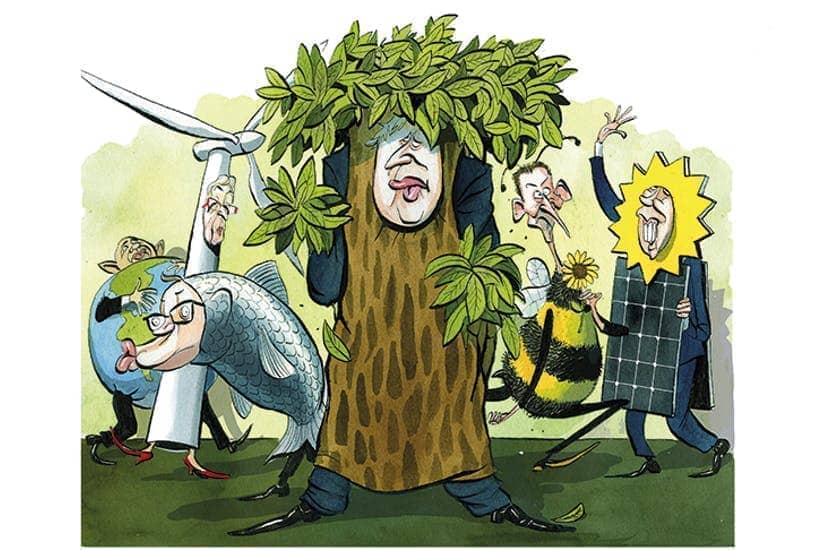Does Boris Johnson really believe, as he told COP26 a few days ago, we’re at ‘one minute to midnight’ on the man-made climate change doomsday clock, and that ‘if we don’t get serious about climate change today, it will be too late for our children to do so tomorrow’?
I ask only because in 2013 he used his Daily Telegraph column to write:
As a species, we human beings have become so blind with conceit and self-love that we genuinely believe that the fate of the planet is in our hands – when the reality is that everything, or almost everything, depends on the behaviour and caprice of the gigantic thermonuclear fireball around which we revolve.
Writing in the same space in 2010, he asked
Is it possible that everything we do is dwarfed by the moods of the star that gives life to the world? The Sun is incomparably vaster and more powerful than any work of man. We are forged from a few clods of solar dust. The Sun powers every plant and form of life, and one day the Sun will turn into a red giant and engulf us all. Then it will burn out. Then it will get very nippy indeed.
Is Boris’s conversion to environmentalism really no less enormous than the one undergone on the subject of Christianity by St Paul on the road to Damascus?
In both columns, Boris told readers his thinking had been informed by ‘the learned astrophysicist’ Piers Corbyn, brother of Jeremy.
He wrote:
According to Piers, global temperature depends not on concentrations of CO2 but on the mood of our celestial orb. Sometime too bright the eye of heaven shines, said Shakespeare, and often is his gold complexion dimmed. That is more or less right. There are times in astronomical history when the Sun has been churning out more stuff – protons and electrons and what have you – than at other times. When the Sun has plenty of sunspots, he bathes the Earth in abundant rays.
When the solar acne diminishes, it seems that the Earth gets colder. No one contests that when the planet palpably cooled from 1645 to 1715 – the Maunder minimum, which saw freezing of the Thames – there was a diminution of solar activity. The same point is made about the so-called Dalton-minimum, from 1790 to 1830.
All of the above seems a far cry from Boris’ comments to the UN General Assembly in September, at which he said:
We still cling with part of our minds to the infantile belief that the world was made for our gratification and pleasure and we combine this narcissism with an assumption of our own immortality. We believe that someone else will clear up the mess we make, because that is what someone else has always done.
Is Boris’s conversion to environmentalism really no less enormous than the one undergone on the subject of Christianity by St Paul on the road to Damascus? If it is, what has occasioned it?
It’s possible, of course, the Prime Minister genuinely believes what he is now saying, and that his change of heart is perhaps the result of access since becoming leader of the nation to better scientists than Piers Corbyn. Equally possible, surely, is that the whole thing is an act not of conscience, but instead of opportunism – a ploy to give the UK early mover advantage in a relatively new but vastly lucrative sector of the global economy.
According to London Stock Exchange subsidiary FTSE Russell, the global green economy was worth £3.5 trillion last year – which is by some margin larger than the oil and gas sector – and growing rapidly.
Already the UK’s low carbon economy employs 1.2 million people and is worth north of £200 billion. Seen in this light, isn’t Boris’ environmental scheme rather brilliant – regardless of whether he believes human beings have the remotest chance of reversing climate change? It’s a chance for the UK, post industrialisation and post Brexit, to steal a march on our rivals by planting a flag at the heart of a movement that now very obviously defines the direction of travel for the global economy – and that is set to for generations to come.
Add to that no one can meaningfully criticise Boris for wanting to save the world. Surely, it’s a better alternative to many of the UK’s traditional hustles for keeping the lights on, which include flogging weapons and looking the other way while vast piles of loot are laundered in the capital.
A year ago this week, the Prime Minister launched his ten-point plan for a ‘green industrial revolution’ – one that would see the government invest £12 billion in order to create 250,000 jobs and to attract more than £36 billion in private sector investment.
Yes, there might now be a great deal of carping about the cut off date for the sale of gas boilers in the UK, and likewise about the banning of the sale of petrol and diesel cars by 2030. But the hope presumably is that as we work toward hitting our newly set net zero by 2050 target we will grow so rich that we will quickly forget.
For the plan to work, obviously its creator and figurehead cannot go around stating, as he didsomewhat patronisingly less than a decade ago:
I’m all for theories about climate change, and would not for a moment dispute the wisdom or good intentions of the vast majority of scientists. But I am also an empiricist; and I observe that something appears to be up with our winter weather, and to call it ‘warming’ is obviously to strain the language.
Are we really a minute from midnight? Perhaps. Even a stopped clock is right twice a day.






Comments